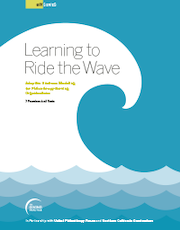Site Search
- resource provided by the Forum Network Knowledgebase.
Search Tip: Search with " " to find exact matches.
Sample disaster preparedness and recovery plans for foundations.
How the government can partner with impact investors to unleash new capital, talent and energy for maximum impact.
This advocacy and civic engagement toolkit is designed for private foundations that want to educate and encourage their grantees about getting involved in civic and policy activities to increase organizational capacity and impact. While its primary...
"Co-Creation" is a case study about the Connecticut Early Childhood Funder Collaborative, a project of the Connecticut Council for Philanthropy. The case study, written by Patricia Bowie, examines co-creation, an emerging systems change collaboration...
Despite a field replete with research, analysis, recommended policies and practices — not to mention an abundance of educational programs and frameworks for grantmaking to diverse communities — philanthropic leaders have been slow to advance these...
This paper explores community democracy as a cultural choice and a potential organizing system for philanthropy using stories that demonstrate its principles and practices, primarily growing from the experience of northern California communities. ...

Developed in partnership with United Philanthropy Forum and Northern California Grantmakers, this guide shares seven practices and 12 tools for Philanthropy-Serving Organizations who seek effective ways to mobilize resources to sustain their...
From the Commonfund, these white papers on investment policy statements, spending policy, board governance and risk tolerance, together with their most recent studies of investments at private and community foundations, operating charities and...
Native Voices Rising is a joint research and re-granting project of Native Americans in Philanthropy and Common Counsel Foundation. This report focuses on the practices and challenges of community organizing...
CNJG's Storify content from their Signature Events.
This weekly conference call series welcomed New Jersey-based grantmakers along with national funders and provided an opportunity for grantmakers to hear from a wide range of experts in the field of disaster philanthropy. This series started on...
Foundations Facilitate Diversity, Equity, and Inclusion: Partnering with Community and Nonprofits, a new report by the OMG Center for Collaborative...
This advocacy and civic engagement toolkit is designed for community and public foundations that want to educate and encourage their grantees about getting involved in civic and policy activities to increase organizational capacity and impact. While...
